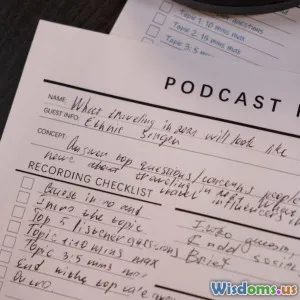
Essential Tips for Effective Writing
8 min read Master effective writing with essential tips that elevate your content creation skills and captivate readers. (0 Reviews)
Essential Tips for Effective Writing
Writing is both an art and a science. Every writer, whether novice or veteran, seeks to captivate their audience, convey ideas clearly, and engage readers in a meaningful way. However, finding the perfect balance can be challenging. In this article, we will explore essential tips and strategies for effective writing that will not only enhance your skillset but also pique your curiosity and inspire action.
Why Writing Well is Important
Effective writing lays the foundation for clear communication in numerous fields—be it academic, professional, or personal. According to a report from the National Commission on Writing, nearly half of all employers rate written communication as a critical skill for job candidates. Furthermore, the higher up the corporate ladder you climb, the more you will rely on excellent writing skills.
In the digital age, content must Not only be persuasive but also accessible and engaging to stand out to your target audience.
Knowing Your Audience
Tailor Your Message
Understanding your target audience is crucial for effective writing. It enables you to adjust your tone and style according to their preferences and expectations. For example, if your audience consists of professionals in finance, using industry jargon, statistics, and data to support your arguments is expected. Conversely, if your audience includes laypeople unfamiliar with the topic, you'll need to simplify complex ideas without dumbing them down.
Create Reader Personas
A powerful tool for honing in on your audience is creating reader personas—fictionalized representations of your ideal readers. For instance, if you're writing for young adults interested in healthy living, consider their values, questions, and the specific language they use.
Crafting a Strong Introduction
The introduction is your first opportunity to grab your reader's attention. Make it count! Begin with a compelling hook—a surprising statistic, a bold claim, or a thought-provoking question.
• Example: "Did you know that studies show we form impressions about a piece of writing within the first 7 seconds?"
This sets a stage for grabbing attention and encourages readers to continue.
Clarity and Conciseness
Write with Precision
Simplicity is often key to clarity. Break complex ideas into digestible chunks. Emotional language and verbose explanations can often cloud the message, whereas clear and concise language helps maintain reader focus. According to Donald Murray, a famous educator in writing, "The best writing is rewriting," so refine your drafts and eliminate as many unnecessary words as possible.
Avoid Jargon Unless Necessary
Unless you’re in a technical field, avoid using specialized jargon or complex words that may alienate your audience. For instance, saying "utilize" instead of "use" can create distance. Instead, aim for language that feels relatable and accessible.
Engaging the Reader
Personable Tone
Engage your audience through a conversational tone. Use personal pronouns like "you" and "I". This connection can make readers feel like you're actually speaking directly to them.
Quote: As Stephen King puts it, "The adverb is not your friend." Instead of using adjectives and adverbs to describe actions, choose strong verbs. Instead of saying, “The dog ran quickly,” say, “The dog sprinted.”
Use Rhetorical Devices
Incorporate rhetorical devices such as metaphors, anecdotes, and analogies. These tools enrich language, evoke emotion, and deepen understanding.
• Example: “Writing without structure is like sailing without a compass—you may drift aimlessly without reaching your destination.”
Structuring Your Content
Outline Your Ideas
Creating an outline is a vital step that can help mold disparate ideas into a cohesive structure with a clear flow. Start with your main thesis and build out the supporting arguments and concepts as subheadings.
For example:
- Introduction: Introduce the topic and its importance.
- Main Body: Break down various aspects, like audience understanding, clarity, engagement, genuine voice, etc.
- Conclusion: Summarize key takeaways and encourage readers to act or reflect.
Using Headers Effectively
Utilize headers to divide content into easily digestible sections. Not only does this improve readability, but it also aids in better organization. Also, consider using numbered lists or bullet points for clarity when discussing multiple points.
Proofreading and Editing
Take a Step Back
Once your draft is complete, set it aside for a while before proofreading. This fresh perspective helps you identify inconsistencies, typos, and convoluted phrases.
Use Editing Tools
There are excellent tools available such as Grammarly, ProWritingAid, or Hemingway, which can help improve the quality of your writing by flagging issues related to grammar, clarity, and style.
Seek Feedback
Sharing your work with peers or mentors can provide invaluable insights. They may catch errors you overlooked or suggest improvements to enhance clarity.
Final Touches
End with a Bang
Like the introduction, your conclusion needs to be impactful. Reiterate the main takeaway and finish strongly, perhaps with a call to action. For instance, encourage readers to start their own writing projects or request feedback on your writing.
Continuous Learning
Effective writing is a skill that evolves over time. Consider enrolling in writing courses, joining workshops, or engaging in writing communities. Many writers, including best-sellers and award-winners, credit consistent practice and education as keys to their ongoing success in writing.
Conclusion
In summary, effective writing is not just about arranging words while adhering to grammatical rules; it’s fundamentally about forging connections between your ideas and the readers. By establishing a clear structure, understanding your audience, engaging them with relatable language, and refining through editing, you can dramatically enhance your writing. Harness these tips, embark on your writing journey, and remember, the power to captivate and inspire is within your grasp.
Rate the Post
User Reviews
Popular Posts



















